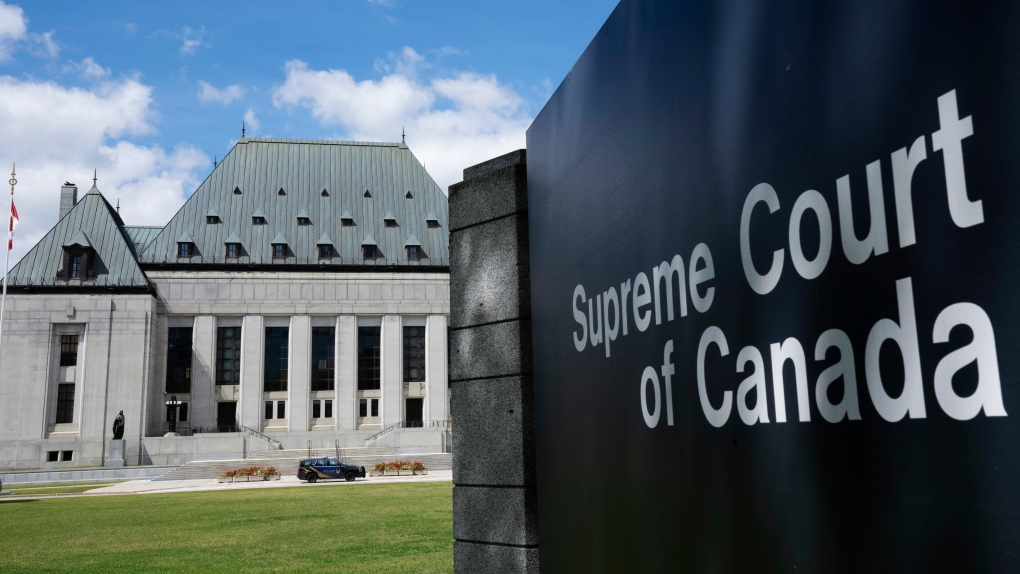Supreme Court of Canada won't hear unvaccinated woman's case for organ donation
 The Supreme Court of Canada is seen, Wednesday, August 10, 2022 in Ottawa. THE CANADIAN PRESS/Adrian Wyld
The Supreme Court of Canada is seen, Wednesday, August 10, 2022 in Ottawa. THE CANADIAN PRESS/Adrian Wyld
The Supreme Court of Canada will not hear the appeal of an Alberta woman who was unwilling to be vaccinated against COVID-19 in order to get a life-saving organ transplant.
Annette Lewis was diagnosed with a terminal disease in 2018 and was told she would not survive unless she received an organ transplant.
She was placed on a transplant wait list in 2020, but was informed a year later she would need to get the COVID-19 vaccine to receive the organ.
Lewis said taking the vaccine would offend her conscience and argued the requirement violated her Charter rights to life, conscience, liberty and security of the person.
"I ought to have the choice about what goes into my body, and a life-saving treatment cannot be denied to me because I chose not to take an experimental treatment for a condition — COVID-19 — which I do not have and which I may never have," Lewis said in an affidavit previously submitted to court.
The case was dismissed by an Alberta court, which said the Charter has no application to clinical treatment decisions, in particular for doctors establishing preconditions for organ transplants.
Justice Paul Belzil ruled that standard of care must be the same for all potential recipients or it could result in "medical chaos."
The Alberta Court of Appeal upheld the decision, prompting Lewis's appeal to the Supreme Court of Canada.
"Ms. Lewis is deeply disappointed that the Supreme Court of Canada decided not to hear her case," Allison Pejovic, Lewis's lawyer, said in a news release from the Justice Centre for Constitutional Freedoms.
"She had hoped that justice would prevail in the courts for herself and other unvaccinated transplant candidates across Canada."
Pejovic said Lewis's constitutional challenge ends with the Supreme Court of Canada's dismissal but she will continue trying to get the life-saving surgery.
Lewis recently filed a separate legal action against Alberta Health Services, an Alberta hospital and the transplant doctors.
There is a publication ban on the doctors' identities, the organ involved and the location of the transplant program.
Lewis is arguing negligence in the decision to remove her from the high-priority transplant list, saying it amounts to medical malpractice.
The Justice Centre for Constitutional Freedoms said Lewis will ask the court at an upcoming injunction hearing to grant an immediate reinstatement to the transplant list pending the result of the court action.
This report by The Canadian Press was first published June 8, 2023.
CTVNews.ca Top Stories

Canada's most wanted fugitive arrested in P.E.I. in connection with Toronto homicide
A suspect in a fatal shooting in Toronto’s east end last summer has been arrested in Charlottetown, just one week after he topped a list of Canada’s most wanted fugitives.
BREAKING Federal employees will be required to spend 3 days a week in the office
Starting in September, public servants in the core public administration will be required to work in the office a minimum of three days a week. The Treasury Board Secretariat says executives will need to be in the office four days per week.
Concerns about plexiglass prompt inspections at some Loblaws locations in Ottawa
Inspections are underway at more than one Loblaws location in Ottawa after complaints were filed about tall plexiglass barriers.
OPP officer said 'someone's going to get hurt' before wrong-way Hwy. 401 crash
As multiple Durham police cruisers were chasing a robbery suspect on the wrong side of Highway 401 Monday night, an Ontario Provincial Police officer shared his concerns, telling a dispatcher, "Someone's going to get hurt."
Poilievre unrepentant over calling Trudeau 'wacko' as his MPs say Speaker should resign
An unrepentant Pierre Poilievre returned to the House of Commons on Wednesday to pepper the prime minister about his drug decriminalization policies after being booted the day prior for refusing to take back calling Justin Trudeau 'wacko' over his approach to the issue.
Five human skeletons, missing hands and feet, found outside house of Nazi leader Hermann Göring
Archeologists have unearthed the skeletons of five people, missing their hands and feet, at a former Nazi military base in Poland.
Toddler of Phoenix first responder dies after bounce house goes airborne
A two-year-old child died after a strong gust of wind sent the bounce house he was in airborne and into a neighbouring lot in central Arizona, the Pinal County Sheriff's Office said.
Plane overshoots runway at airport in St. John's, N.L., no injuries reported
Investigators from the Transportation Safety Board of Canada are headed to St. John's, N.L., after a plane overshot a runway at the city's airport this afternoon.
A teen was found buried in a basement in New York. An engraved ring helped police learn her identity two decades later
For more than two decades, the unknown victim was nicknamed "Midtown Jane Doe" because she was found in the Hell's Kitchen neighbourhood of New York City. But this week, investigators finally revealed her identity.

































